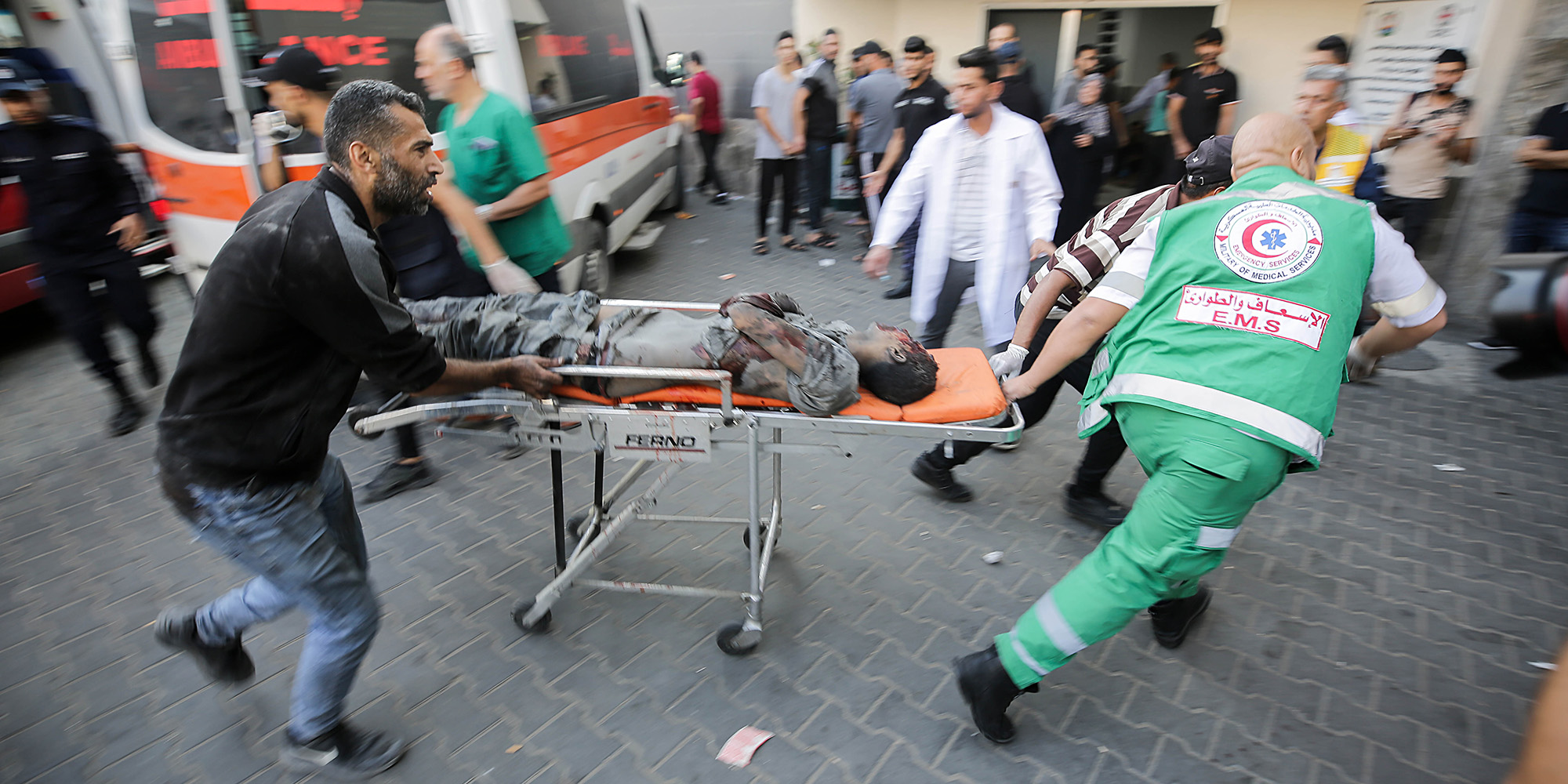The World Health Organization (WHO) has strongly condemned Israel’s orders for the evacuation of 22 hospitals treating more than 2,000 inpatients in northern Gaza, saying this would worsen the humanitarian and public health catastrophe.
“The lives of many critically ill and fragile patients hang in the balance: those in intensive care or who rely on life support; patients undergoing hemodialysis; newborns in incubators; women with complications of pregnancy and others all face imminent deterioration of their condition or death if they are forced to move and are cut off from life-saving medical attention while being evacuated,” the WHO said.
Health facilities in northern Gaza continue to receive injured patients and are struggling to operate beyond maximum capacity, with some patients being treated in corridors and outdoors in surrounding streets because of a lack of hospital beds.
“Forcing more than 2,000 patients to relocate to southern Gaza, where health facilities are already running at maximum capacity and unable to absorb a dramatic rise in the number of patients, could be tantamount to a death sentence,” the WHO said.
On 12 October, the WHO called for the immediate establishment of a humanitarian corridor to the Gaza Strip, to ensure unimpeded access to health and humanitarian supplies, as well as the evacuation of injured patients.
The WHO warned that the health system in Gaza was at “breaking point”, and that time was running out to “prevent a humanitarian catastrophe” if life-saving supplies were not allowed through Israel’s total blockade of the region.
Read more in Daily Maverick: Health system at ‘breaking point’ and ‘humanitarian catastrophe’ loading in besieged Gaza Strip, WHO warns
Israel imposed the blockade on Gaza in the aftermath of a coordinated attack by the Islamist militant group Hamas, which breached Israeli defences on Saturday, 7 October. It has been widely reported that more than 1,300 Israelis were killed in the attack, which coincided with the Jewish Sabbath and a religious holiday, while others were taken hostage by Hamas.
The blockade of Gaza, announced on Monday, 9 October, includes a ban on food and water entering the enclave, as well as cutting electricity. The 365km² region is home to about 2.3 million people, making it one of the most densely populated areas in the world.
Read more in Daily Maverick: Gaza Strip — history of densely populated enclave is critical to understanding current conflict
The Gaza Strip has been hit by a barrage of Israeli air attacks in the days following the Hamas incursion. By Sunday, more than 2,300 Palestinians including 724 children had been killed in these attacks. A further 51 had been killed in the occupied West Bank.
Need for humanitarian access
A plane carrying 78 cubic metres of medical supplies from the WHO’s logistics hub in Dubai landed at El Arish airport in Egypt on 14 October. The supplies will be delivered to Gaza to meet critical health needs as soon as humanitarian access through the Rafah crossing is established, the WHO said.
“Every hour these supplies remain on the Egyptian side of the border, more girls and boys, women and men, especially those vulnerable or disabled, will die while supplies that can save them are less than 20 kilometres away,” it said.
The international health agency will work with the Egyptian and Palestinian Red Crescent Societies to ensure transportation and delivery of the supplies through Egypt and into Gaza.
On 9 October, the WHO director-general, Dr Tedros Adhanom Ghebreyesus, met with Egyptian President Abdel Fattah El-Sisi, who agreed to a WHO request to facilitate the delivery of health and other humanitarian supplies from the WHO to Gaza via the Rafah crossing. However, while the Egyptian side of the crossing was accessible, the Israeli side remained closed on Sunday.
“The critically injured, the sick, and the vulnerable cannot wait. Too many lives have already been lost. WHO joins the calls for an immediate opening of a humanitarian crossing through the Rafah border into Gaza, for safe onward delivery of life-saving supplies to health facilities, for the delivery of fuel, water, food and other items essential for survival, and for the protection of health care workers, patients, and civilians,” said WHO.
Read more in Daily Maverick: Ramaphosa calls for opening of Gaza humanitarian corridor, end to rampant Israel-Hamas violence
/file/dailymaverick/wp-content/uploads/2023/10/Screenshot-2023-10-15-at-14.29.13.png)
Gift of the Givers on the ground in Gaza
The Gift of the Givers founder, Dr Imtiaz Sooliman, said that Gift of the Givers teams had been assisting as best as they could in Gaza — despite movement, communication and security challenges.
“Our teams, under severe physical, emotional and mental stress, whilst being afraid of the wellbeing of their own families, have been committed to assist the general population in Gaza as best they can,” he said.
The disaster response non-governmental organisation has purchased medical supplies, medicines and wheelchairs for the injured at multiple hospitals in Gaza.
“Patients receive new clothing and hygiene items as they arrive at hospital with no accessories through the merciless bombing,” Sooliman said. “Fifteen hospitals and 23 ambulances have been struck deliberately.”
Gift of the Givers is also funding fuel purchases for the ambulances.
Sooliman said they were providing water for thousands through their three desalination plants. “Once the electricity was cut off by Israel, we have been sustaining them on generators through whatever fuel is available,” he said.
Gift of the Givers has provided hot meals to thousands, delivered food parcels to communities and given families vouchers to purchase whatever they require from nearby businesses, said Sooliman.
The organisation has partnered with businesses in Khan Younis, Deir al-Balah and East Gaza to distribute emergency shopping vouchers to help displaced people buy food, water, hygiene items and other basic necessities.
“We have built trust with the people through our 14-year presence in the country and items are released by the businesses in advance of payment,” Sooliman said.
“We are preparing a much bigger humanitarian intervention with diverse supplies in the event passage of goods is permitted through the Rafah border. A special aid flight is also being considered. We have asked our Gaza team to employ more personnel and increase networks to ensure continuity of distribution in the event they get killed, which is a very distinct possibility given the risks they have to take,” he said.
Donors have been asked to support Gift of the Givers’ ongoing efforts to provide rapid emergency relief to Gaza’s displaced people during this humanitarian crisis.
Online donations can be made here, while the banking details are here. DM





 A Palestinian man injured in an Israeli rocket attack is rushed in to Al Shifa hospital in Gaza City, 14 October 2023. (Photo: EPA-EFE / Haitham Imad)
A Palestinian man injured in an Israeli rocket attack is rushed in to Al Shifa hospital in Gaza City, 14 October 2023. (Photo: EPA-EFE / Haitham Imad) 
